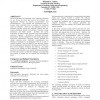ATAL
2009
Springer
14 years 6 months ago
2009
Springer
Game theoretic approaches to patrolling have become a topic of increasing interest in the very last years. They mainly refer to a patrolling mobile robot that preserves an environ...
ATAL
2009
Springer
14 years 6 months ago
2009
Springer
The Modular Architecture for Bootstrapped Learning Experiments (MABLE) is a system that is being developed to allow humans to teach computers in the most natural manner possible: ...
ATAL
2009
Springer
14 years 6 months ago
2009
Springer
The ability to guarantee that a system will continue to operate correctly under degraded conditions is key to the success of adopting multi-agent systems (MAS) as a paradigm for d...
ATAL
2009
Springer
14 years 6 months ago
2009
Springer
Hybrid Scheduling Problems (HSPs) combine temporal and finite-domain variables via hybrid constraints that dictate that specific bounds on temporal constraints rely on assignments...
ATAL
2009
Springer
14 years 6 months ago
2009
Springer
The ability to proactively offer assistance promises to make personal agents more helpful to their users. We characterize the properties desired of proactive behaviour by a person...
ATAL
2009
Springer
14 years 6 months ago
2009
Springer
This paper argues that the agent-based simulation approach is just the one appropriate to the social sciences (including economics). Although there were many predecessor approache...
ATAL
2009
Springer
14 years 6 months ago
2009
Springer
This paper describes the design, implementation, visualizations, results and lessons learned of a novel real-world socio-technical research system for the purpose of rescheduling ...
ATAL
2009
Springer
14 years 6 months ago
2009
Springer
Previous work in multiagent coordination has addressed the challenge of planning in domains where agents must optimize a global goal, while satisfying local resource constraints. ...
ATAL
2009
Springer
14 years 6 months ago
2009
Springer
The most important and interesting of the computing challenges we are facing are those that involve the problems and opportunities afforded by massive decentralization and disinte...
ATAL
2009
Springer
14 years 6 months ago
2009
Springer
Two-player games of billiards, of the sort seen in recent Computer Olympiads held by the International Computer Games Association, are an emerging area with unique challenges for ...




